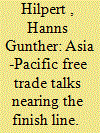| Srl | Item |
| 1 |
ID:
138926


|
|
|
|
|
| Summary/Abstract |
Asia is not only the world’s most dynamic region in terms of trade, it is also an important pacesetter in trade policy. The USA is currently negotiating with 11 partner countries over a Trans-Pacific Partnership (TPP); the members of the ASEAN+6 group are in talks over a Regional Comprehensive Economic Partnership (RCEP), while Japan, China and Korea are conducting trilateral trade negotiations (China-Japan-Korea Free Trade Agreement (CJK FTA)). The multilateral structures emerging from all these initiatives could, in the long term, be combined into a Free Trade Area of the Asia-Pacific (FTAAP). What are the motives behind these agreements? What are their chances of being implemented? When it comes to the trade and geopolitical power struggle that encompasses these talks, does the USA or China have the upper hand? And what role remains for Europe’s trade policy?
|
|
|
|
|
|
|
|
|
|
|
|
|
|
|
|
| 2 |
ID:
182572


|
|
|
|
|
| Summary/Abstract |
In 2019, Trilateral Cooperation celebrated its 20th anniversary. As China, Japan and South Korea are close trade partners, economic cooperation is a focal point in Trilateral Cooperation. This paper endeavours to examine and explain China’s approach towards the institutionalization of trilateral economic cooperation from 1999 to 2019. The findings indicate that China was supportive towards institutionalizing trilateral economic cooperation, but it was less proactive in recent years. This is explained by two factors, namely, (a) the declining economic interdependence between China and other member states and (b) the shift in China’s regional strategy with the introduction of new regional initiatives by China, especially the Belt and Road Initiative. The findings of this study cast doubt on the critical juncture approach and the alternative explanation on balancing which perceives China’s participation in Trilateral Cooperation primarily through the lens of Sino-US relations.
|
|
|
|
|
|
|
|
|
|
|
|
|
|
|
|